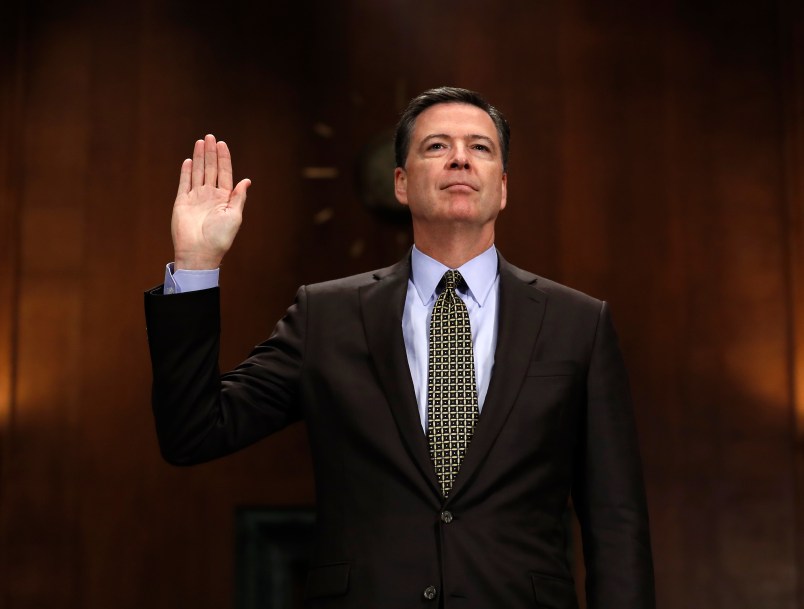FBI Director James Comey said Wednesday that it makes him “mildly nauseous” to think announcing the discovery of new emails potentially related to the agency’s investigation into Hillary Clinton’s private email server influenced the outcome of the U.S. presidential election.
But he said that even in hindsight, he would make that same decision again.
“I stared at ‘speak’ and ‘conceal,’ and ‘speak’ would be really bad,” Comey testified before the Senate Judiciary Committee. “There’s an election days away—Lordy, that would be really bad. Concealing in my view would be catastrophic, not just to the FBI but well beyond. And honestly’ as between really bad and catastrophic, I said to my team we’ve got to walk into the world of really bad.”
Sen. Dianne Feinstein (D-CA), the ranking member of the committee, asked why he felt it necessary to make this announcement just 11 days before Election Day, given the FBI’s practice of not commenting on ongoing investigations.
Comey said he felt compelled to tell Congress that the FBI was restarting its probe in a “hugely significant way” after discovering thousands of new emails, some of which he said contained classified information, on the computer belonging to top Clinton aide Huma Abedin’s husband, former congressman Anthony Weiner.
“Anybody who disagrees with me with me has to come back to Oct. 28 with me and stare at this and tell me what you would do. Would you speak or would you conceal?” Comey asked. “I could be wrong, but we honestly made the decision in those two choices and even in hindsight, and this has been one of the most painful decisions, I would make the same decision. I would not conceal that to Congress.”
Feinstein scoffed when Comey said he did not make a public announcement, but instead sent a “private letter” to the chairs and ranking members of the Senate and House Oversight Committees.
“It was just a matter of minutes before the world knew about it,” she said.
The California Democrat added that nothing of value was found in the emails, and that Comey’s decision affected the campaign.
Comey said there was “a great debate” at the agency about how to act, and that one of his junior lawyers asked him if he should “consider that what you’re about to do may help elect Donald Trump president.”
“I said thank you for raising that,” Comey went on. “Not for a moment. Because down that path lies the death of the FBI as an independent institution in America. I can’t consider for a second whose political fortunes would be affected in what way. We have to ask yourselves what is the right thing to do and then do that thing.”
Watch a clip of his remarks below







Well congratulations and thanks for making us all walk right into it over exactly nothing. But, just a followup. Where was ‘really bad’ regarding Russian connections to Trump? That wasn’t ‘really bad’? Can we get a definition of ‘really bad’? Did you stare at that for a while to talk yourself out of reporting on Trump?
What internal discussions did Comey have about ‘speak’ or ‘conceal’ re the Trump investigation? Why was his decision different?
Truly a fucking idiot. So he would throw the election again in order to announce what turned out to literally be nothing.
Partisan fucking moron.
You beat me to it.
It makes Comey “mildly nauseous” to think he was instrumental in electing DT, yet after seeing the effects up close and personal for 100 days he would make that same decision again.
Perfect.